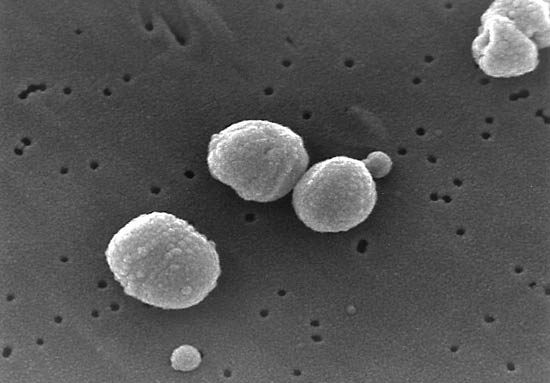pneumococcus
bacterium
 (Streptococcus pneumoniae), spheroidal bacterium in the family Streptococcaceae that causes human diseases such as pneumonia, sinusitis, otitis media, and meningitis. It is microbiologically characterized as a gram-positive coccus, 0.5 to 1.25 μm (micrometre; 1 μm = 10-6 metre) in diameter, often found in a chain configuration and surrounded by a capsule consisting of complex carbohydrate (polysaccharide). Many serological types have been differentiated. Pneumococci normally occur in the upper respiratory tract.
(Streptococcus pneumoniae), spheroidal bacterium in the family Streptococcaceae that causes human diseases such as pneumonia, sinusitis, otitis media, and meningitis. It is microbiologically characterized as a gram-positive coccus, 0.5 to 1.25 μm (micrometre; 1 μm = 10-6 metre) in diameter, often found in a chain configuration and surrounded by a capsule consisting of complex carbohydrate (polysaccharide). Many serological types have been differentiated. Pneumococci normally occur in the upper respiratory tract.Pneumococci have proved useful in elucidating microbial genetics. The phenomenon of transformation—an alteration of one cell by another—was first observed in these organisms in 1928. Colonies formed by pneumococci usually are small, round, and smooth. Occasional mutant rough colonies are produced by organisms that cannot synthesize the capsular material. When a rough colony is grown in the presence of genetic material (deoxyribonucleic acid) from a smooth colony, the rough colony is transformed into a smooth one.
Pneumococci are separated into types depending on the specific capsular polysaccharide formed. The disease-causing ability of pneumococci resides in the capsule, which delays or prevents their destruction by phagocytes, cells in the bloodstream that normally engulf foreign material.
- divider
- divination
- Divine Comedy, The
- Divine, Father
- divine office
- divine right of kings
- Divine Word Missionary
- diving
- diving bell
- diving duck
- diving petrel
- diving suit
- Divini, Eustachio
- divining rod
- Divinópolis
- Divisibility rules
- division
- Division I National Collegiate Athletic Association (NCAA) Championship-men
- Division I National Collegiate Athletic Association (NCAA) Championship-women
- divisionism
- division of labour
- divorce
- Divriği
- Divākarapaṇḍita
- Diwali